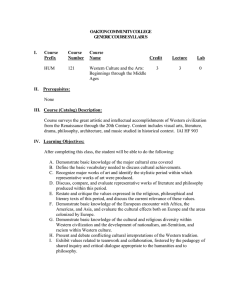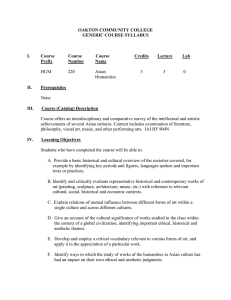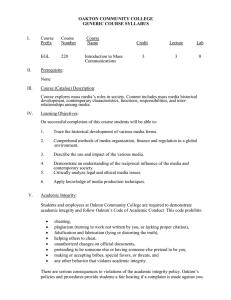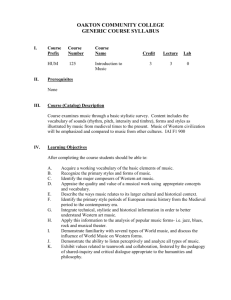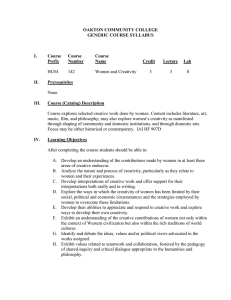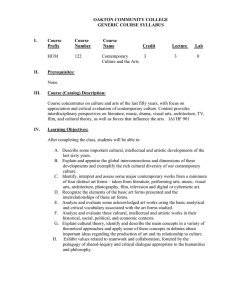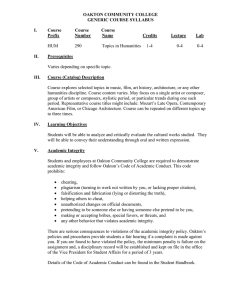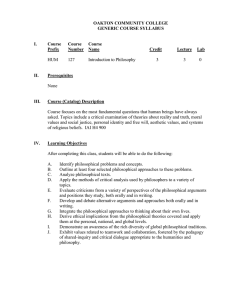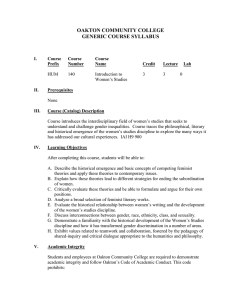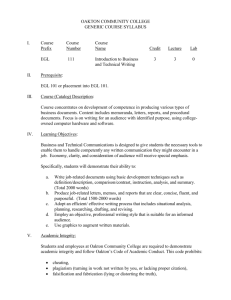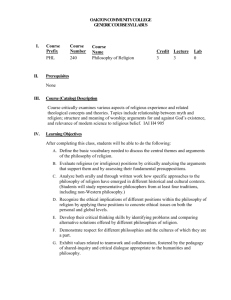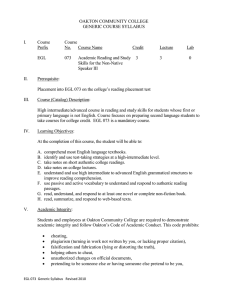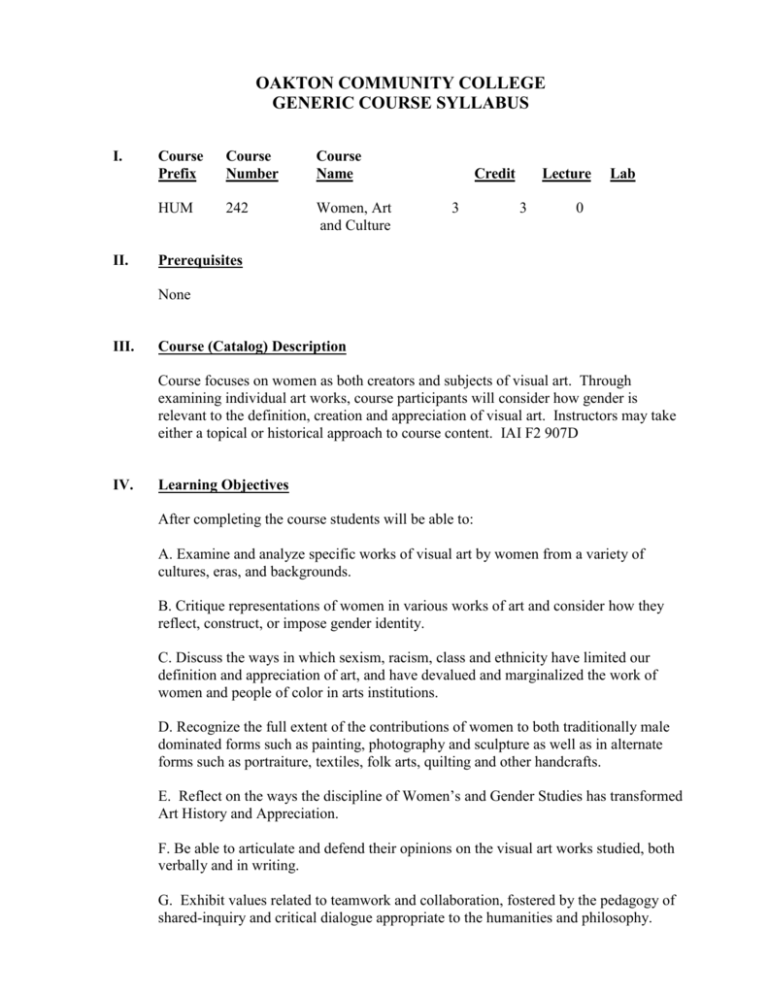
OAKTON COMMUNITY COLLEGE
GENERIC COURSE SYLLABUS
I.
II.
Course
Prefix
Course
Number
Course
Name
HUM
242
Women, Art
and Culture
Credit
3
Lecture
3
Lab
0
Prerequisites
None
III.
Course (Catalog) Description
Course focuses on women as both creators and subjects of visual art. Through
examining individual art works, course participants will consider how gender is
relevant to the definition, creation and appreciation of visual art. Instructors may take
either a topical or historical approach to course content. IAI F2 907D
IV.
Learning Objectives
After completing the course students will be able to:
A. Examine and analyze specific works of visual art by women from a variety of
cultures, eras, and backgrounds.
B. Critique representations of women in various works of art and consider how they
reflect, construct, or impose gender identity.
C. Discuss the ways in which sexism, racism, class and ethnicity have limited our
definition and appreciation of art, and have devalued and marginalized the work of
women and people of color in arts institutions.
D. Recognize the full extent of the contributions of women to both traditionally male
dominated forms such as painting, photography and sculpture as well as in alternate
forms such as portraiture, textiles, folk arts, quilting and other handcrafts.
E. Reflect on the ways the discipline of Women’s and Gender Studies has transformed
Art History and Appreciation.
F. Be able to articulate and defend their opinions on the visual art works studied, both
verbally and in writing.
G. Exhibit values related to teamwork and collaboration, fostered by the pedagogy of
shared-inquiry and critical dialogue appropriate to the humanities and philosophy.
Generic Course Syllabus
HUM 242
V.
Page 2
Academic Integrity
Students and employees at Oakton Community College are required to demonstrate
academic integrity and follow Oakton’s Code of Academic Conduct. This code
prohibits:
cheating,
plagiarism (turning in work not written by you, or lacking proper citation),
falsification and fabrication (lying or distorting the truth),
helping others to cheat,
unauthorized changes on official documents,
pretending to be someone else or having someone else pretend to be you,
making or accepting bribes, special favors, or threats, and
any other behavior that violates academic integrity.
There are serious consequences to violations of the academic integrity policy. Oakton’s
policies and procedures provide students a fair hearing if a complaint is made against
you. If you are found to have violated the policy, the minimum penalty is failure on the
assignment and, a disciplinary record will be established and kept on file in the office
of the Vice President for Student Affairs for a period of 3 years.
Details of the Code of Academic Conduct can be found in the Student Handbook.
VI.
Outline of Topics
(This is a list of suggested topics. Instructors may choose to approach this class
historically or topically. In your outline of topics please specify the dates on which you
will cover specific topics as well as other important dates, such as exams and paper
deadlines.)
A. Middle Ages—tapestries, illustrated manuscripts, Medieval convents, Hildegard
of Bingen
B. Renaissance Art—Elizabetta Sirani, Sofonisba Anguissola, Properzia de Rozzi,
Artemisia Gentileschi, etc.
C. 17th-18th century Dutch and Flemish Artists—Judith Leyster, Rachel Ruysch,
Clara Peters, etc.
D. 19th century Artists—Rosa Bonheur, Edmonia Lewis, Camille Claudel, Mary
Cassatt, Berthe Morisot, etc.
E. 20th Modernists—Sonia Delauney, , Hannah Hoche, Gunta Stoltzl, etc.
F. Modern “Masters”—Kathe Kollwitz, Frida Kahlo, Georgia O’Keeffe
G. Women in Photography—Julia Margaret Cameron, Claude Cahun, Dorothea
Lange
H. The Female Form—objectification, pornography or art?—Lottie Laserstein,
Suzanne Valadon, Peter Paul Rubens, Ingres, Pierre-Auguste Renoir
I. Images of motherhood in the art of men and women
Generic Course Syllabus
HUM 242
Page 3
J. Women in the Graphic Arts
K. Quilting and other handcrafts
L. Contemporary trends in women’s art—Betye Saar, Judy Chicago, Barbara
Kruger
M. Globalization and women’s art
VII.
Methods of Instruction
Course may be taught as a face-to-face, media-based, hybrid, or online course.
A.
B.
C.
D.
E.
Lectures and discussion
Small group work
Films and slide shows
Field trips to public forums, galleries, plays, and performances
Guest speakers
VIII. Course Practices Required
(Please include information here about all expectations you have for your students
regarding behavior, work, etc. The following are sample topics you may wish to cover.
Please be aware that you must require students in this course to produce at least 15
pages of critical written assignments over the course of the semester. These may be
assigned in a variety of ways including journals, response papers, field trip projects,
etc.)
A. Standards for written work
B. Quizzes/Exams
C. Participation
D. Essays
E. Final Project
F. Special policies about make-up exams, late papers, or other matters of concern
IX.
Instructional Materials
Note: Current textbook information for each course and section is available on
Oakton’s Schedule of Classes.
What follows are examples of appropriate texts.
Women, Art and Society by Whitney Chadwick
Guerilla Girls Bedside Companion to the History of Western Art by the Guerilla Girls
Global Feminisms: New Directions in Contemporary Art by Maura Reilly
Expanding Discourse: Feminism and Art History, Ed by Broud and Garrard
Women Artists in History: from Antiquity to the Present by Wendy Slatkin
Generic Course Syllabus
HUM 242
X.
Page 4
Methods of Evaluating Student Progress
(In this section, please present the percentages or point breakdown of their final grade.
The writing assignments should count for at least 40% of the final grade. An example
follows.)
A. Quizzes/Exams……40 points
B. Essays……40 points
C. Final project with oral presentation……10 points
D. Attendance and participation………10 points
E. Grading scale: 90-100, A…….80-89, B………70-79, C……….60-69……..D
XI.
Other Course Information
A. Disabilities
If you have a documented learning, psychological, or physical disability you may
be entitled to reasonable academic accommodations or services. To request
accommodations or services contact the Access and Disability Resource Center at
the Des Plaines or Skokie campus. All students are expected to fulfill essential
course requirements. The College will not waive any essential skill or requirement
of a course or degree program.
B. Discrimination
The Oakton Community College Catalog states:
Oakton Community College does not discriminate on the basis of race, color, creed,
religion, national origin, disability, age, sex, sexual orientation, or marital status in
admission to and participation in its educational programs, activities and services,
or employment practices. The College does not tolerate sexual harassment or
sexual assault by or of its students or employees.
In keeping with this policy of tolerance and non-discrimination, in this class all of
us (myself included) should strive to listen and give careful consideration to all
ideas expressed in class, especially those that are different from our own, without
attacking or demeaning the people who have those views. We should also strive to
avoid using insulting terms or telling offensive jokes when talking to or about
individuals or groups.
C. Instructor information
Office number and office hours:
Phone number:
Email and website:
Generic Course Syllabus
HUM 242
Page 5
Approval Dates:
(Faculty: Do not include the following information on your individual syllabi created for class
distribution.)
Effective beginning term:
Fall 2013
Ending term:
Syllabus prepared by: Hollace Graff
Date: March 2006
Revised by:
Date: June 2010
Kathleen Carot
Reviewed by Chair:
Hollace Graff
Date: July 2010
Approval by Dean:
Linda Korbel
Date
June 2013

